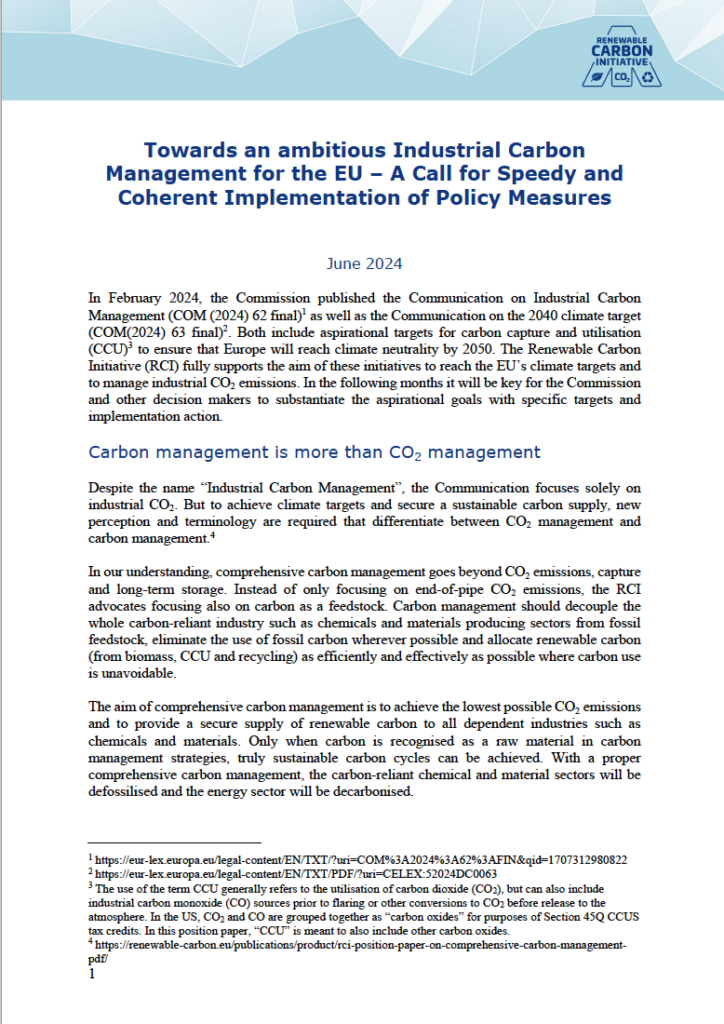
1) Publication of RCI Position Paper “Towards an ambitious Industrial Carbon Management for the EU – A Call for Speedy and Coherent Implementation of Policy Measures”
On 3 July 2024, the RCI released a new position paper titled “Towards an ambitious Industrial Carbon Management for the EU” following the European Commission’s recent communications on Industrial Carbon Management (COM (2024) 62 final) and the 2040 climate target (COM (2024) 63 final). In the paper, RCI positively acknowledges the included focus on CCU, defossilisation and inclusion of carbon as a feedstock. At the same time, RCI wants to capitalise on these developments by calling for a speedy and coherent implementation of further policy measures.
For more details take a look at the renewable carbon news: https://renewable-carbon.eu/news/comprehensive-industrial-carbon-management-calls-for-fast-and-coherent-implementation-of-policy-measures/
You can download the full position of the RCI at: https://renewable-carbon.eu/publications/product/towards-an-ambitious-industrial-carbon-management-for-the-eu-a-call-for-speedy-and-coherent-implementation-of-policy-measures-pdf/
2) Report and Feedback Meeting – Evaluating LCA Approaches and Methodologies for Renewable Carbon Sources
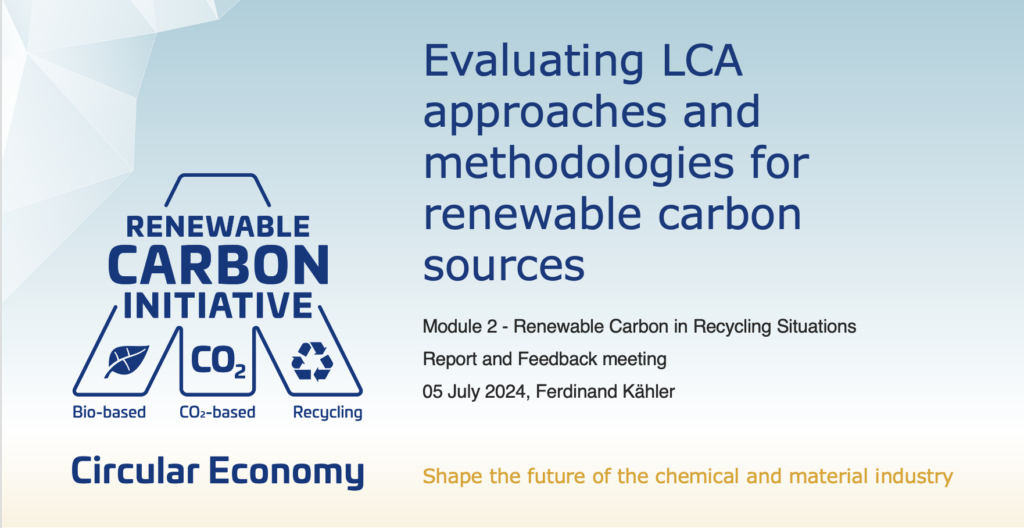
On 5 July 2024, Ferdinand Kähler from the WG Sustainability of the RCI led a meeting focused on module 2 “Renewable Carbon in Recycling Situations” of the project “Evaluating LCA Approaches and Methodologies for Renewable Carbon Sources”. Ferdinand provided an overview of the project and its progress, discussing two key challenges for LCA practitioners: “Different System Boundaries and Biogenic Carbon” and “LCA Approaches for Recycling”. He concluded by outlining the next and final steps of the project.
3) RCI Webinar – Last and Upcoming Webinar on Startup Pitches
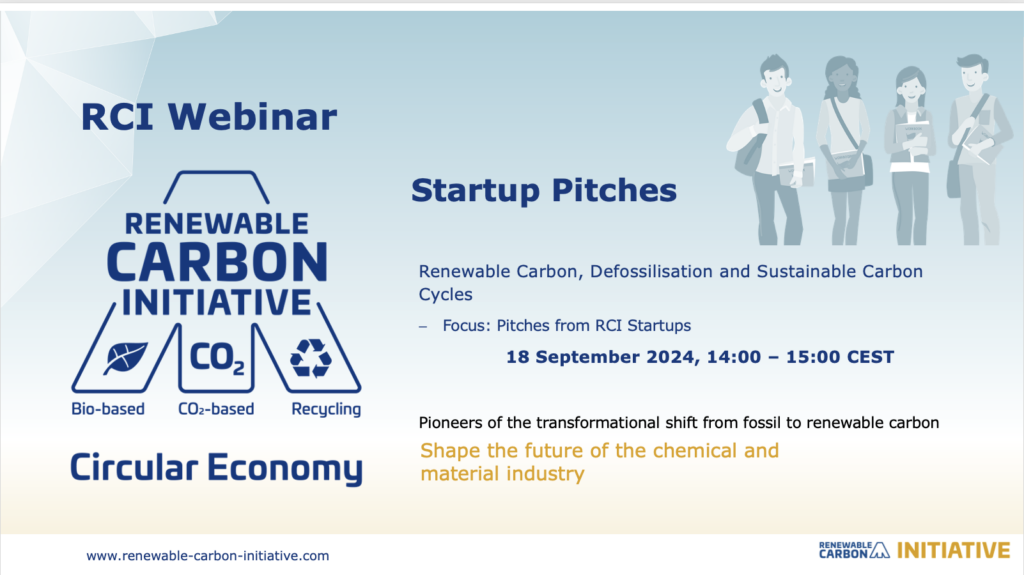
During the last RCI webinar on 11 July 2024 from 14:00 to 15:00 CEST, Christopher vom Berg from RCI presented the work and impact of the RCI. Attendees learned about RCI’s latest projects and how we’re driving the transformation in the industry. Arndt Scheidgen, Head of Product Stewardship at Henkel Consumer Brands joined us and shared insights as an industry leader.
RCI’s upcoming free webinar on 18 September 2024 from 14:00 to 15:00 CEST will be showcasing exciting pitches from our innovative startups. After a refreshing summer break, we will resume our webinar series featuring promising companies, each given approx. 10 minutes to present their groundbreaking ideas and solutions.
So far, two innovative companies have confirmed their participation: amynova Polymers (DE) and ChainCraft (NL). More startups will follow soon.
amynova Polymers (DE) is a company that develops, researches, and manufactures amylofol®, an innovative, starch-based biopolymer. Due to its unique characteristics, amylofol® has a high potential for increasing crop protection and fertilization efficiency in agricultural production, as a barrier coating on paper and packaging, and for dust binding in different industries and the environment. amylofol® can also be used as a formulation aid for cosmetics and personal care and as a lubricant in industrial processes. amylofol® can replace conventional polymer substances that are difficult to degrade and harmful to health and the environment and thus fulfil already today’s European requirements.
Find out more here: https://www.amynova.com/en/
ChainCraft (NL) is a start-up company converting food residues (waste) into medium chain fatty acids using proprietary fermentation technology, which are or can be used in various markets ranging from animal nutrition, flavours & fragrances and food additives, agriculture, and the chemical industry to synthesize ingredients for detergents, personal care, lubricants, etc. Its products contain 100% renewable carbon and have a proven lower carbon footprint compared to either fossil based or palm based fatty acids. Moreover, its products score significantly better in Life Cycle Assessments than the traditional alternatives.
Find out more here: https://chaincraft.com
This webinar offers a unique opportunity to witness firsthand the creativity and entrepreneurial spirit driving our startup community forward. From groundbreaking technologies to innovative business models, each presentation promises to inspire and educate.
Whether you’re an investor scouting for the next big opportunity, an industry professional seeking new insights, or simply curious about the latest innovations, this webinar is not to be missed.
You are cordially invited to this event!
Find out more: https://renewable-carbon-initiative.com/events/
4) ICM Forum – Working Group on CCU – Second Meeting
The Industrial Carbon Management Forum (ICM Forum), previously known as the CCUS Forum until 2023, was established in 2021 and has held annual meetings since its inception. The Forum brings together representatives from EU institutions, EU and non-EU countries, NGOs, business leaders and academia to promote the deployment of CCUS technologies.
Currently, the efforts of the ICM Forum are supported by four Working Groups (WGs). These groups are organised by the Commission and moderated and supported by co-chairs selected from the participating stakeholders to ensure a balanced representation of NGOs, think tanks, public administration, academia and industry associations. The WGs are set up for one year, until the end of 2024, and include
- WG on CO2 Infrastructure
- WG on CO2 standards
- WG on public perception
- WG on Carbon Capture and Utilisation (CCU)
These working groups are made up of a wide range of stakeholders and meet regularly throughout the year to prepare issue papers for the Forum’s annual plenary meeting.
RCI is a member of the WG on CCU, led by DG Energy, which met for the second time on 15 July 2024.
5) RCI Ambassador Activities:
Meeting in Brussels with DG ENVI on bio-based plastics
On 2 July 2024, another workshop on bio-based plastics took place at the DG Environment offices. With the Commission officials, we discussed definitions, target design and the interplay with recycling targets for bio-based plastics. Overall, the discussion continues to be constructive and positive. We advocated for a broad and inclusive definition of bio-based plastics (without limitations on content thresholds), and we mentioned that bio-attributed plastics also need to be included in any future framework. The discussion about the targets was still quite vague and general, but many important points were raised that will need to be clarified in the impact assessment. We consider it a key win that DG ENVI is now also including CCU-based plastics in the discussion and will set up a separate meeting on this topic. Further follow-up on bio-based plastics will be in September (topic: sustainability criteria) and October (topic: biogenic carbon accounting).
C.A.R.M.E.N. Symposium 2024 in Straubing
Michael Carus presented the Renewable Concept and Initiative at an annual meeting of C.A.R.M.E.N. e.V., the Central Network for the Marketing of Agricultural Raw Materials and Energy, which was founded on 6 July 1992 in Rimpar near Würzburg by the Free State of Bavaria (Germany). Since 2012, C.A.R.M.E.N. e.V. has also been actively supporting the implementation of the goals of energy system transformation.
In addition to biomass for energy, fuels and chemicals & materials, the network’s focus has now expanded to include CO2 use, and presentations showed the status of projects on CO2 pipelines, temporary storage and CO2 use. Temporary storage means that the stored CO2 can be extracted for use.
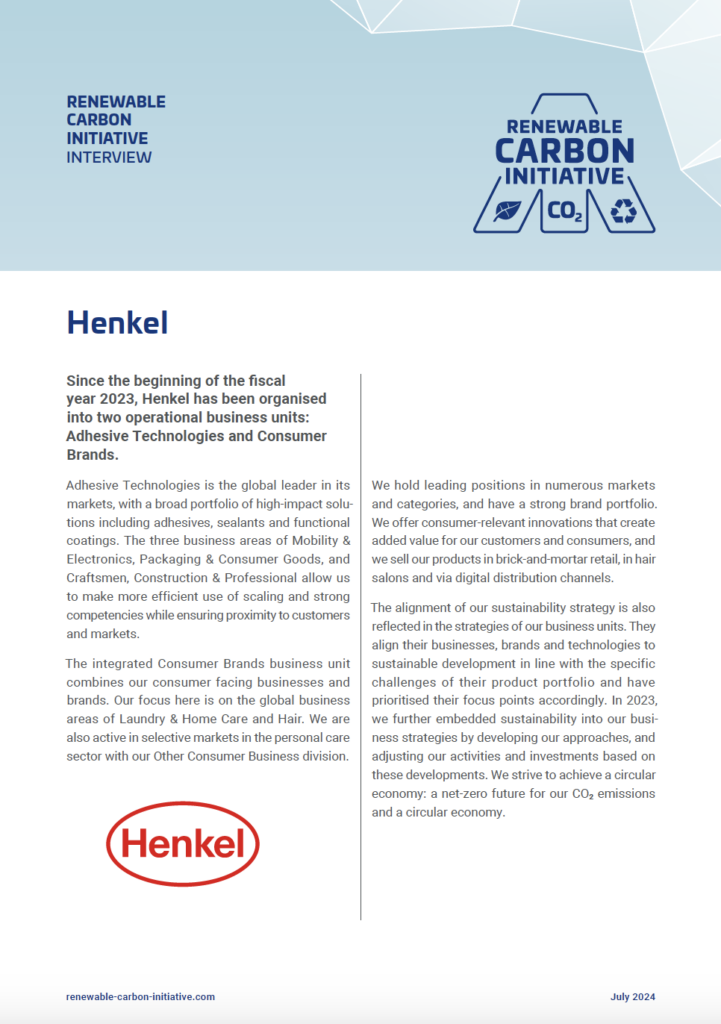
6) RCI Member Interview: Henkel
RCI’s latest interview features member Henkel. Christine Schneider, Senior Manager Global Sustainability, Henkel Consumer Brands, Germany and Adrian Brandt, Head of Bio-Renewable Materials Platform, Henkel Adhesive Technologies, Germany explained Henkel’s commitment to sustainability and the transition from fossil to renewable carbon in its products and processes.
Henkel is focused on integrating bio-based, CO2-based, and recycled materials into their operations to achieve a circular economy. The company emphasises reducing, reusing, and recycling packaging, and actively collaborates with stakeholders to improve recycling infrastructure and technologies. Henkel’s Adhesive Technologies and Consumer Brands units are both working towards increasing the use of renewable raw materials and ensuring that their products contribute to a sustainable and circular economy. The Renewable Carbon Initiative (RCI), of which Henkel is a founding member, plays a crucial role in supporting these efforts and promoting defossilisation across the industry.
Find the interview here: https://renewable-carbon-initiative.com/members/henkel/
This month, we would like to introduce you to Leibniz-Institut für Verbundwerkstoffe (IVW) (DE).
7) RCI member portraits
Here are five interesting facts about Leibniz-Institut für Verbundwerkstoffe (IVW) as shared by Dr Barbara Güttler, Manager Material Cycles at IVW:
- Leading Research in Composite Materials: The IVW is a leading research institution in Germany focused on the development and application of composite materials. Their work spans across various critical fields, including mobility, energy, climate, and healthcare, where they explore innovative materials, construction methods, and manufacturing processes.
- Competence Field – Material Cycles: IVW is heavily invested in researching and promoting the use of renewable and recycled materials. Their competence field “Material Cycles” emphasises the characterisation and novel application scenarios for these materials, aiming to create a closed-loop material cycle that minimizes environmental impact.
- Contribution to Climate Protection and Energy Efficiency: IVW’s research in renewable carbon-based composites significantly impacts climate protection and energy efficiency. Composite materials are crucial for lightweight applications in sectors such as aviation, reducing fuel consumption and emissions. They are also used in wind blades, turbines, and hydrogen storage solutions, enhancing the performance of renewable energy systems.
- Increasing Integration of Bio-Based Materials: The institute actively integrates bio-based materials into their composites, often collaborating with industry partners to develop innovative products. These materials offer lower embodied energy, reduced environmental footprints, and significant mass savings, which are essential for mobility applications.
- Active Participation in the Renewable Carbon Initiative (RCI): As a member of the Renewable Carbon Initiative (RCI), IVW is at the forefront of promoting sustainable composite materials. Their membership enables collaboration with other RCI members, fostering the development of next-generation polymers and fibers. IVW is a reliable research partner with a great interest to lead the composite materials community together with partners towards holistic sustainable material cycles.
Find out more about Leibniz-Institut für Verbundwerkstoffe (IVW) here: https://renewable-carbon-initiative.com/members/leibniz-institut-fur-verbundwerkstoffe/
Stay tuned for more member portraits and inspiring stories from RCI!
8) RCI new members:
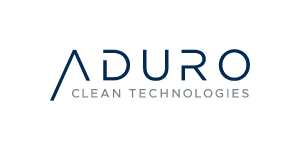
AduroClean Technologies (CA) is a developer of patented water-based technologies to chemically recycle waste plastics; convert heavy crude and bitumen into lighter, more valuable oil, and transform renewable oils into higher-value fuels or renewable chemicals.
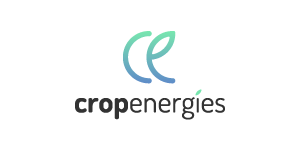
CropEnergies (DE) stands for sustainable, renewable products from biomass. With their products, CropEnergies contributes to a climate-friendly world and ensures that fossil carbons remain in the ground permanently.
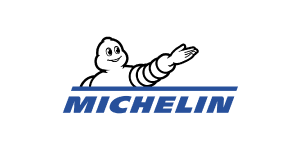
Michelin (FR) is a global leader in tire manufacturing and mobility solutions and dedicated to innovation, quality, and sustainability. Drawing on its deep know-how in polymer composites, Michelin is constantly innovating to manufacture high-quality tires and components for critical applications in demanding fields as varied as mobility, construction, aeronautics, low-carbon energies, and healthcare.

Procter & Gamble (P&G) (US) is one of the largest and most successful consumer goods companies globally, known for its innovation in product development and marketing strategies for household and personal care products. The company operates in over 180 countries and employs thousands of people worldwide.
Source
Renewable Carbon Initiative, original text, 2024-07-26.
Supplier
European Commission
Renewable Carbon Initiative (RCI)
Share
Renewable Carbon News – Daily Newsletter
Subscribe to our daily email newsletter – the world's leading newsletter on renewable materials and chemicals










